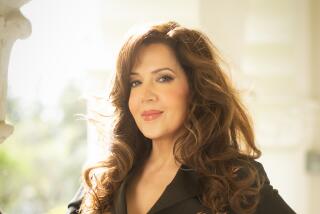Mother-Daughter Businesses Need a Working Relationship to Succeed
- Share via
On this second annual “Take Our Daughters to Work Day,” Rachel Salinas will be able to glance across the office and see her daughter, Terie, busy at a variety of tasks. But then, she can do that any day.
That’s because Terie, 32, is the boss at Superior Powertrain, an automotive transmission remanufacturer in Huntington Park, which the two women co-own.
“There’s no doubt about it, she’s in charge,” said Rachel, 56.
“But we make all the decisions together,” Terie added.
Mothers and daughters working together has become the hot new trend in small business, largely because more women are starting companies than ever before.
While their ranks are still small, their successes have been visible: Working Women magazine cited among the nation’s top women-owed companies Minnesota-based Smead Manufacturing, built by a mother-daughter team into a $200-million operation with 2,600 employees. In Los Angeles, one of the biggest women-owned businesses is Frieda’s Inc., which wholesaled more than $23 million in exotic produce under the guidance of Frieda Caplan and her daughters, Karen and Jackie.
“Fathers and sons seem to be sort of standard,” said Jon Goodman, director of USC’s entrepreneur program. “That reflects how few women in the previous generation opted for the work world, and that has changed radically.”
But women are opening companies at a rate more than twice that of men, and they now own slightly more than a third of the businesses in the United States, said Julie Weeks, director of research for the National Assn. of Women Business Owners. An estimated 6.5 million women-owned companies collectively employ more people than all of the Fortune 500 firms combined, she said.
Among more than 600 family-owned companies surveyed last year by the Gallup Organization for Massachusetts Mutual Life Insurance Co., 46% reported that a son was actively involved in the business and 19% said a daughter was involved.
But while working with your family can be rewarding, it can also be very challenging, experts warn.
Family businesses can be fragile, and only an estimated 30% survive a year after the second generation takes over, said Jacqueline Freiberg, director of the University of San Diego Family Business Institute.
She said avoiding mother-daughter conflicts in the workplace can be accomplished through communication, flexibility and forbearance when it comes to those special torments that only family members know how to inflict.
Freiberg also recommends that the children first gain experience outside the family business and that all involved formally assess their strengths and weaknesses. Weekly meetings, perhaps led by a neutral third party, are helpful, as are outside confidants and mentors for both mother and daughter, she said. Formal job descriptions and compensation plans are also a good idea, she said.
“It’s really important for both parties to be mature and to know what buttons to push and what not to push,” Freiberg said.
Shirley Pepys admits that she had concerns four years ago when she invited her daughter, Renee, now 29, to join NoJo Inc., a Rancho Santa Margarita-based baby clothing and accessories company she founded with a neighbor 23 years ago.
“I still do,” Pepys said. She wants to avoid a situation she encountered where a company’s brother and sister co-owners alternated claiming the president’s title and duties because that was the only way they could work out their power struggle. If any of her three other children join NoJo, Pepys said, she will insist on counseling for everyone to resolve family rivalries and help them work together.
“All of the business in the world isn’t worth risking your family relationships,” she said.
But the skills Renee brought to NoJo have been partly responsible for the company’s rapid growth during the last two years, and she was recently appointed chief operating officer, Pepys said.
“She is much more of a manager, a better one than I am,” Pepys said. “I’m more creative and marketing-driven.”
Karen Caplan, president and chief executive of Frieda’s Inc., which her mother founded 32 years ago, credits family members’ complementary skills for helping catapult the business to new sales heights. But she also remembers a particularly vocal argument with her mother several years ago conducted in the middle of the produce wholesaler’s Downtown Los Angeles operations.
“The employees thought, ‘Oh my God. A) How could Karen talk to her mother like that? and B) What’s going to happen with the company?’ ” Caplan said. But honest discussion, divorced from family feelings, is one of the secrets behind running a successful family business, she said.
“We don’t let our family relationships hinder how we honestly feel,” said Caplan, who admits that she and her mother, now company chairman, are both “very outspoken.”
“I’ve worked there since I was 10 years old,” she said. “My mother had a rule: You don’t get any preferential treatment if you’re a member of the family at the office.”
At the same time, working with family means there is an unspoken trust and sense of values, Caplan said. In recent negotiations for a new site, the other family members relied on her to scout out locations and sign the lease before they went to visit the facility.
“It’s a lot different than just having someone work for you,” said Caplan, whose husband also works at Frieda’s (and has instituted a talking-about-work moratorium at home). “I wouldn’t have it any other way. . . . Every day we draw from each other.”
At Superior Powertrain, which the two bought five years ago, Terie Salinas handles sales, marketing and administration while mother Rachel oversees the production end.
“We’re trying to be more than a mom-and-pop operation,” said Terie, who hopes to expand the five-employee firm with capital recently received from the RLA (formerly Rebuild L.A.) minority business loan fund.
“We’re growing, so there are growing pains,” she said. “It hasn’t been easy.”
“But she has a pretty level head on her shoulders,” Rachel said. “I let her run it the way she thinks is best.”
More to Read
Inside the business of entertainment
The Wide Shot brings you news, analysis and insights on everything from streaming wars to production — and what it all means for the future.
You may occasionally receive promotional content from the Los Angeles Times.










